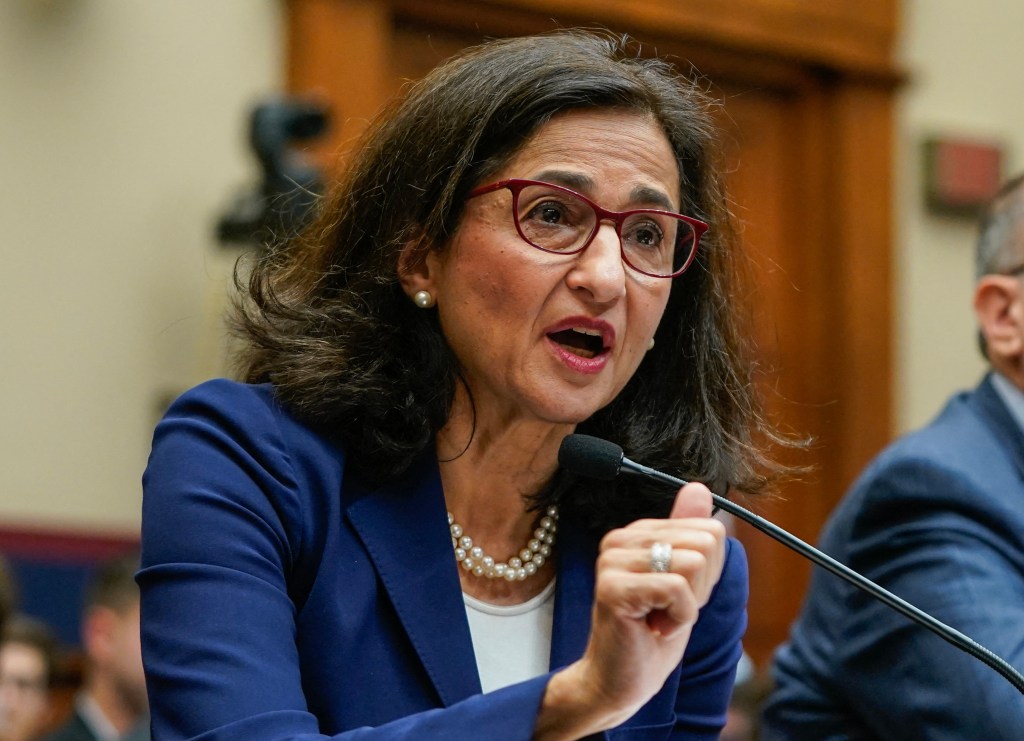Columbia University’s exceptionally poised president, Nemat Shafik, clearly has no intention of going down like the former heads of Harvard University and the University of Pennsylvania, both driven from their jobs following disastrous appearances before a congressional committee investigating campus antisemitism.
Testifying before the same panel last week, she readily agreed with Republicans’ premise that pro-Palestinian activism at Columbia is shot through with anti-Jewish bigotry, and explained how, under her leadership, Columbia is cracking down. Fifteen students, she said, had been suspended, and six more were on disciplinary probation. Visiting scholar Mohamed Abdou, who expressed support for Hamas, Hezbollah and Islamic Jihad, “will never work at Columbia again,” she said, and several other members of the faculty are under investigation. If it had been up to her, she said, the stridently anti-Zionist professor Joseph Massad would never have gotten tenure. There was some confusion at the hearing about whether Massad was still chair of an academic review committee, but if he was, Shafik pledged that he would be removed. (Columbia later confirmed that his chairmanship was scheduled to end after this semester.)
By bending over backward to be agreeable, Shafik at first appeared to have emerged from the four-hour grilling largely unscathed. But as protests continued on the Columbia campus, so too has largely GOP pressure for her to resign. Meanwhile, the political showdown has badly damaged Columbia’s guarantee of academic freedom.
Shafik appeared with two chairs of Columbia’s board of trustees, Claire Shipman and David Greenwald, and with David Schizer, a former dean of Columbia’s law school who is one of the chairs of the school’s antisemitism task force. The university, said Shipman, was taking steps to restrict student protests: “One of the excellent recommendations of our antisemitism task force is that they have said that if you are going to chant, it should only be in a certain place, so that people who don’t want to hear it are protected from having to hear it.”
But protests are by their nature intrusive; it’s hard to see the point of a demonstration that’s audible only to those who opt in. “Has there been any disciplinary action taken against students who have chanted, ‘From the river to the sea?’” Elise Stefanik, R-N.Y., who scored a major political victory with the previous hearings, asked, citing a common anti-Zionist slogan. “We have some disciplinary cases ongoing around that language,” Shafik responded.
Chilling effect
You don’t have to like anti-Israel language or activism to be worried about congressional demands to suppress it. These hearings are highly unusual; it’s hard to think of a time since the anti-communist House Un-American Activities Committee when Congress has made such an effort to investigate disfavored ideologies in academe.
There is no question that in recent months there have been incidents of blatant, unacceptable antisemitism at Columbia: a swastika was graffitied in a campus bathroom, and an Israeli student hanging up posters of hostages was assaulted. And as at many other schools, some at Columbia have celebrated terrorism; in an ugly Oct. 8 essay repeatedly cited at the hearings, Massad wrote of “jubilation and awe” occasioned by the “innovative Palestinian resistance” of Oct. 7. But just as the existence of communists in America didn’t justify McCarthyism, the rhetorical grotesqueries of parts of the campus left don’t make it OK for Congress to demand that universities curtail denunciations of Israel while it wages a brutal war in the Gaza Strip.
The chilling effect of these investigations is already clear nationwide. Just this week, the University of Southern California canceled the graduation speech of its valedictorian, Asna Tabassum, a Muslim criticized by some Jewish groups for her pro-Palestinian social media activity. The decision, the school’s provost said in a statement, is “consistent with the fundamental legal obligation — including the expectations of federal regulators — that universities act to protect students and keep our campus community safe,” making it clear administrators are feeling government pressure.
Such pressure is the point: Republicans want to silence Israel’s opponents. In one of the hearing’s most farcical moments, Rick Allen, R-Ga., asked Shafik whether she knew Genesis 12:3. She didn’t recall the biblical passage offhand, so he explained it to her. “It was the covenant that God made with Abraham, and that covenant was real clear: ‘If you bless Israel I will bless you, if you curse Israel I will curse you,’” he said, explaining how this compact was confirmed in the New Testament.
“Do you consider that a serious issue?” Allen asked heatedly. “Do you want Columbia University to be cursed by God?” Shafik responded, “Definitely not.” Allen continued, “Young people are being indoctrinated by these professors to believe this stuff, and they have no idea that they’re going to be cursed by God, the God of the Bible and the God over our flag.”
‘It breaks my heart’
This wasn’t an exchange, I’d venture, intended to ensure that Jews feel at home in American institutions. Another Republican, Brandon Williams, compared diversity, equity, and inclusion statements to Nazi loyalty oaths. Naturally, no one pushed back.
Just before the hearing began, a group of students from Columbia and its sister school, Barnard, organized a “Gaza solidarity encampment” on Columbia’s main lawn. Shafik took the extraordinary step of calling police in to dismantle it, and more than 100 people were arrested. The last time the school’s administration brought in the NYPD to disperse demonstrations was in 1996, and many on campus were in shock.
“I never imagined I’d ever see my university acting like this,” said legal scholar Katherine Franke, who was coordinating legal defense for the arrested students. “It breaks my heart.” (During the congressional hearings, she’d been called out for remarks she’d made about student veterans of the Israeli military.) Among those suspended for participating in the protest was Isra Hirsi, the daughter of Rep. Ilhan Omar, a Democrat who sits on the committee overseeing the antisemitism inquiry.
At the hearing last week, Nathaniel Moran, R-Texas, crowed that Columbia’s leadership had clearly “learned at least some of the lessons from the magnificent failures of Harvard, MIT and UPenn when they appeared here several months back.” They certainly have.
Michelle Goldberg is a New York Times columnist.

